What Makes a Good Zombie Movie?
It is probably true that, were it possible to copyright ideas, George A Romero would be a billionaire by now. His signature creation, the zombie, has become utterly ubiquitous in popular culture, inspiring videogames, films, TV shows, graphic novels, comic books and even music (and music videos). It seems we simply cannot get enough of zombies and zombie related media, which is weird, considering how unpleasant they are.
A lot has been written about their allegorical nature, which was made fairly explicit by Romero’s Dawn of the Dead, which had zombies drawn to the mall just as they were in life, and Edgar Wright’s Shaun of the Dead, in which the dead-eyed monotony of everyday life was almost indistinguishable from the zombie apocalypse. Clearly, our appetite for them is fuelled by some deep, psychological unease about our place in the world, or maybe it’s just because they’re gory, either way, that isn’t what I’m concerned with in writing this article. No, what I want to find is what makes for a good zombie movie.
The first thing that sprang to mind was a claustrophobic location. This is, for me, something of a hallmark of the genre, or rather sub-genre, that is the zombie movie. No zombie movie can really function without it, or rather it will need to compensate in other areas to make up for it. This hallmark was established in the very first movie in the sub-genre, the film that invented the whole concept of reanimated corpses shuffling about, groaning and feasting on the living. That film is, of course, The Night of the Living Dead.
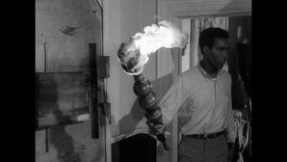 The first, and best, film in the Living Dead franchise is still, for me, the best zombie film ever made, and a large part of that comes from one thing: the claustrophobia. A ragtag group of strangers all wind up in a small, abandoned farmhouse as the walking dead close in on them from all sides. It’s a masterpiece of slow-building tensions, a pot-boiler in black and white that slowly ascends from mild peril to all-out zombie onslaught by a series of bad mistakes, bad luck and un-dead children. The film seldom leaves the confines of the boarded up farmhouse, which, shot in stark, grainy black and white, is oppressively claustrophobic, and the even-worse basement, where the aforementioned zombie child resides. The film has other merits, but what sets it apart from the vast majority of zombie films is the brilliantly executed use of such a small space for so many people.
The first, and best, film in the Living Dead franchise is still, for me, the best zombie film ever made, and a large part of that comes from one thing: the claustrophobia. A ragtag group of strangers all wind up in a small, abandoned farmhouse as the walking dead close in on them from all sides. It’s a masterpiece of slow-building tensions, a pot-boiler in black and white that slowly ascends from mild peril to all-out zombie onslaught by a series of bad mistakes, bad luck and un-dead children. The film seldom leaves the confines of the boarded up farmhouse, which, shot in stark, grainy black and white, is oppressively claustrophobic, and the even-worse basement, where the aforementioned zombie child resides. The film has other merits, but what sets it apart from the vast majority of zombie films is the brilliantly executed use of such a small space for so many people.
Further exemplars of this principle include the much-maligned 3rd film in the Dead franchise, Day of the Dead, which, for all its numerous flaws (none of which will I even try to defend) is almost made a pure horror classic by just how densely, oppressively, unbearably confined the setting is. The characters are sealed in an underground bunker, for almost the entire duration of the film and there is little to no sunlight, only the sterile grey humming light of halogen bulbs. The other example that sprang immediately to mind was the utterly brilliant “infected” film [Rec], which is set exclusively in a posh apartment building, which, by the end, is packed to bursting point with red-eyed, growling, snarling infected. The setting, then, adds a great deal to any zombie film and, as far as I can work out, the more tightly packed all the characters are into that setting, the better.
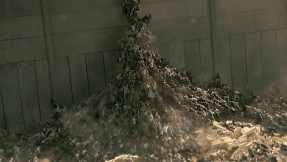 Zombie films that fail often miss this trick. Going back to the Dead franchise, one of the main reasons that Diary of the Dead was such a god-awful film was that, if memory serves, the location was not fixed, there was no sustained sense of danger because it was punctuated by long periods of time out in the open in a bus. The same problem applies to Land of the Dead, which is intermittently good, but only when the setting is scaled down to somewhere small, like an abandoned shop. Again, when it ventures too far outside, it falters. The same problem applies to World War Z, which is genuinely good when the globe-trotting segments are eschewed in favour of good old fashioned tension. If you want a demonstration of my point, compare the zombie onslaught at Jerusalem against the later scenes at the medical facility. What you end up with is a series of set pieces, devoid of any real context or tension because you know at all times that Brad Pitt can hop on a plane and escape.
Zombie films that fail often miss this trick. Going back to the Dead franchise, one of the main reasons that Diary of the Dead was such a god-awful film was that, if memory serves, the location was not fixed, there was no sustained sense of danger because it was punctuated by long periods of time out in the open in a bus. The same problem applies to Land of the Dead, which is intermittently good, but only when the setting is scaled down to somewhere small, like an abandoned shop. Again, when it ventures too far outside, it falters. The same problem applies to World War Z, which is genuinely good when the globe-trotting segments are eschewed in favour of good old fashioned tension. If you want a demonstration of my point, compare the zombie onslaught at Jerusalem against the later scenes at the medical facility. What you end up with is a series of set pieces, devoid of any real context or tension because you know at all times that Brad Pitt can hop on a plane and escape.
The same principle applies to TV shows, but to a lesser extent. A confined space increases the tension, but it can be limiting, so is only really appropriate for shorter periods of time, no more than a few hours. Dead Set, the Charlie Brooker scripted zombie mini-series, always worked best when it was confined to the Big Brother set and its surrounding buildings, and lost some of its tension when the action was refocused to other characters outside the confines of the TV station. The Walking Dead must, however, be considered, being, as it is, the seminal zombie drama. I feel, however, that it does not fall within the confines of what I am writing about because the zombies are not the focus. In that way it is almost sui generis, a human drama where the zombies merely provide the backdrop as opposed to being that much of an active force in the world in which the series is set. To that extent, there is no need to confine the characters, save for when the focus is on the horror element of the show, not the drama.
The 2nd element that I feel is necessary for a good zombie movie is a ragtag group of stragglers and survivors. These characters need not necessarily be likeable, or even know each other very well, but they need to combine with the tightly packed environment to create a certain chemistry. In short, for good or for bad, we need to care about these characters and what happens to them. I of course only mean that in the horror movie sense of caring about them. No one needs or expects to care enough about the characters that, if something bad were to happen to them, you would burst into tears, but they need to have some manner of personality, even if it is just “douchebag.”
This requirement is best exemplified, again, in the original zombie movie, The Night of the Living Dead, where the loose association of strangers forced together by extraordinary circumstances produces a good deal of the dramatic tension, and, in fact, contributes immensely to the feeling of claustrophobia. All those people crammed into such a small space, all shouting and airing contrary opinions, cannot help but be fairly intense. Were they a unified group of people who all got along well, the film would be fairly simple, straightforward, and lacking in tension, but the constant bickering forces the viewer to pick sides. Everyone, of course, sides with Ben, but that’s another matter…
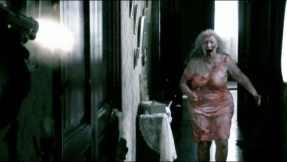 Further examples can be found in pretty much every piece of zombie related media ever made, such as the continually bickering group of survivors in both of the Dawn of the Dead films, the similarly dysfunctional groups of survivors in both the Walking Dead TV series and the brilliant episodic adventure game made by Telltale Games, and the previously insular neighbours of the ill-fated [Rec] apartment building. In all cases, zombies form a terrifying backdrop, an excuse, for the forcing together into close quarters of characters who have no business spending any amount of time with one another.
Further examples can be found in pretty much every piece of zombie related media ever made, such as the continually bickering group of survivors in both of the Dawn of the Dead films, the similarly dysfunctional groups of survivors in both the Walking Dead TV series and the brilliant episodic adventure game made by Telltale Games, and the previously insular neighbours of the ill-fated [Rec] apartment building. In all cases, zombies form a terrifying backdrop, an excuse, for the forcing together into close quarters of characters who have no business spending any amount of time with one another.
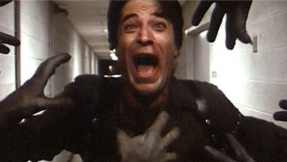 The same principle can be observed in another horror film that I consider to be something of a modern classic, Frank Darabont’s The Mist. In the mist, a similarly ragtag bunch of unrelated people are trapped together in a supermarket when a mysterious and deadly mist filled with massive monsters descends onto a small American town. The terror of the mist itself soon gives way to the dangers inside the shop as the inhabitants are slowly converted by a religious zealot into a braying, violent of mob of fanatics bent on killing the protagonist and his allies. The film showcases an accelerated version of the kind of faction-based splintering often seen in zombie movies, the brutal tail-end of which is most readily apparent in Day of the Dead, which shows the very end of this process as the ragged group of survivors, pushed to breaking point, tear themselves apart.
The same principle can be observed in another horror film that I consider to be something of a modern classic, Frank Darabont’s The Mist. In the mist, a similarly ragtag bunch of unrelated people are trapped together in a supermarket when a mysterious and deadly mist filled with massive monsters descends onto a small American town. The terror of the mist itself soon gives way to the dangers inside the shop as the inhabitants are slowly converted by a religious zealot into a braying, violent of mob of fanatics bent on killing the protagonist and his allies. The film showcases an accelerated version of the kind of faction-based splintering often seen in zombie movies, the brutal tail-end of which is most readily apparent in Day of the Dead, which shows the very end of this process as the ragged group of survivors, pushed to breaking point, tear themselves apart.
To go back again, then, to World War Z, we see the importance of this kind of character based story-telling. What we get in World War Z is entirely outside of this tradition, with brad Pitt jetting off around the world solo, accompanied part of the way by a series of forgettable, bland, nothing characters. In Israel he meets an old Jewish intelligence expert, who talks in exposition, and then in Korea he meets squaddies in the traditional, army jargon spouting, tough guy mould. Even the Israeli soldier he adopts as a sidekick and the scientists at the medical facility remain blank, simply there for the purposes of furthering the plot, and his family are largely ignored, serving the role of motivation as opposed to any actual role in the story. In the end, all there is in the movie is a series of interchangeable faces passing in and out of Brad Pitt’s gravitational pull, making little impact and having no influence on the story.
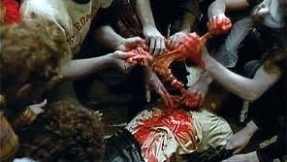 A further ingredient lacking in World War Z that I would say is essential is gore. Yes, that’s right, gore. When you’re dealing with reanimated (or infected) humans who are compelled to bite and tear at the flesh of the living, you’re going to get some gore, or, at least, some blood. If you get bitten on the throat, or even on the arm… or anywhere really, there will be blood. Depending on the location of the bite, there could even be a lot of blood, and, if more than one attacks at a time, horrible dismemberment could ensue. To have a zombie apocalypse without any blood or broken bones, or guts and tendons or anything of the sort just seems sanitised. Any film willing to have a woman’s hand cut off without any noticeable bleeding is a film I want no part of.
A further ingredient lacking in World War Z that I would say is essential is gore. Yes, that’s right, gore. When you’re dealing with reanimated (or infected) humans who are compelled to bite and tear at the flesh of the living, you’re going to get some gore, or, at least, some blood. If you get bitten on the throat, or even on the arm… or anywhere really, there will be blood. Depending on the location of the bite, there could even be a lot of blood, and, if more than one attacks at a time, horrible dismemberment could ensue. To have a zombie apocalypse without any blood or broken bones, or guts and tendons or anything of the sort just seems sanitised. Any film willing to have a woman’s hand cut off without any noticeable bleeding is a film I want no part of.
This feeds into my final stipulation about zombie movies. Well, it’s not a stipulation so much as something I think is a necessity: it needs to be at least a 15. In America I guess this would be an R rating. Any zombie movie that stands any chance of being in any sense visceral or terrifying needs to have enough terror in it to warrant a high enough rating that it should be reserved for people who are either adults or almost adults. There needs, in short, to be a sense of danger. A sense that anything could happen to any of the characters at any point, but it’s telling in World War Z that precious few of the characters with speaking parts get killed and, even then, when they do, there’s no blood and no sense of terror.
This is not to say that a good zombie film must have all of these ingredients, just that one would probably need some of them. If not the confined space, then at least the ragtag bunch of survivors, and, if not those two, then at least the visceral terror of knowing that, at any moment, one or more of the characters could have their throat ripped out. It is plausible that someone could make a good zombie film without any of these things, but it would likely end up a Walking Dead style drama where zombies merely provide the backdrop for the real conflicts. In any case, lacking all of these things, World War Z is a bit of a let-down and not a very good zombie film.
What do you think? Leave a comment.











I agree with everything but I would like to have something different on my plate to enjoy a new Zombie movie instead of the old ingredient that have been done many times before. Time for filmmakers to play with this genre further into new intelligent ventures…
Great article and I agree! Also agree with Utah’s comment above, as much as I love the sub-genre, it is increasingly stale. That’s why if you haven’t, I would definitely recommend watching VHS-2?!There is a short in it directed by Gregg Hale and Eduardo Sanchez called A Ride in the Park – novelty wears off quick but it’s a refreshing take on the zombie tale, showing it from the zombie’s perspective – not in a Warm Bodies heart-felt kind of way but more gory-ruining-a-kids-birthday kind of way!
Very good article and not bad, you even included some none-US movies like [Rec] ! Currently some very nice gems are being produced outside of the US. If you will write about Zombies again, maybe you would consider to explore Zombie movies from all over the world?
Great article.
I think the Zombie film must have all three elements you mention or it is just a mediocre facsimile of a horror trope. These elements can be, and are, used in other sub-genres of horror but all three together make for the zombie film. I agree that the human element of The Walking Dead obstructs the true nature of the horror going on around them, but at least they aren’t afraid of killing off characters in the process.
I definitely agree with the points you make. Are we not going into an era now where comedy is being merged with everything and therefore it’s loosing the old-timey horror that is a good zombie movie?
I love the article – I would love to see how your criteria extend to the new(ish) genre of zombie-comedy films like Zombieland and Shaun of the Dead. I think the criteria still seem to apply, especially the importance of likable characters!
I have not seen world war z yet from what Iam reading its not looking good! Was it anything like the book? At at least reading the story was ok So thanks for the insight
I suppose I see it differently. I’ve been a huge fan of zombie movies since seeing the original Dawn of the Dead in the 1980’s. I’ve loved even some of the worst B grade zombie films out there but find the general straggler/survivor film repetitive and done so many times kind of boring.I was hoping World War Z movie would encompass something new like how a global community would react to the onset of a zombie Apocalypse and then organize and fight back. That’s why I found the ending of the movie World War Z so disappointing. It went back to the same old story repeated over and over again instead of being fresh.
I understand your reasoning and agree to a certain extent that your article talks about classic horror films. Something World War Z certainly wasn’t… ‘scary’. I just want to see a fresh perspective.
Very helpful blog! It is easy to use, and answered all my questions! I will be back after I finish my first set of Zombie movies I got from the list!
Very good ingredients that are necessary for a good zombie show. I guess that is why I enjoy the Walking Dead TV series so much, as it seems to have all these. One of the most frightening aspects of the whole “zombie apocoylpse” theory is the thought of what will happen to humanity. The likelihood of a group of people whom all know and like each other being some of the only survivors is unlikely. It is more likely to be what we see….a bunch of strangers banded together with one goal in mind….survival. The chances of them all getting along and working together completely in synch all the time is slim, so we know there will not only be battles outside to fight, but also battles within, that can be just as bloody and gruesome as what they are facing from the zombies.